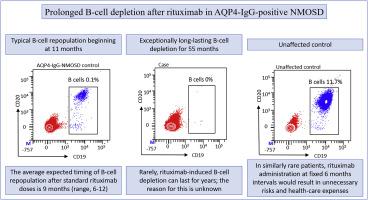Journal of Neuroimmunology ( IF 3.3 ) Pub Date : 2021-07-18 , DOI: 10.1016/j.jneuroim.2021.577666 Elia Sechi 1 , Roberto Zarbo 1 , Maria Angela Biancu 1 , Paola Chessa 2 , Maria Laura Idda 3 , Valeria Orrù 3 , Sandra Lai 3 , Stefania Leoni 1 , Paolo Solla 1

|
Rituximab (a B-cell depleting monoclonal antibody) is increasingly utilized for treatment of different immune-mediated neurologic disorders, including aquaporin-4-IgG-positive neuromyelitis optica spectrum disorder (AQP4-IgG-NMOSD). After an initial treatment course, the drug is generally reinfused when peripheral blood B-cells levels re-increase >1% (usually after 6–12 months), or at fixed pre-planned 6-month intervals. We describe the unusual case of a 40-year-old woman with AQP4-IgG-NMOSD who showed a prolonged B-cell depletion for nearly five years after a single rituximab reinfusion. In similar rare patients with exceptionally long-lasting B-cell depletion, rituximab reinfusions at fixed pre-planned intervals would result in unnecessary treatment-related risks and health-care expenses.
中文翻译:

利妥昔单抗治疗 AQP4-IgG 阳性视神经脊髓炎谱系障碍患者的 B 细胞耗竭时间延长
利妥昔单抗(一种 B 细胞耗竭单克隆抗体)越来越多地用于治疗不同的免疫介导的神经系统疾病,包括水通道蛋白 4-IgG 阳性视神经脊髓炎谱系疾病 (AQP4-IgG-NMOSD)。在初始疗程后,当外周血 B 细胞水平重新增加 >1%(通常在 6-12 个月后)时,或以预先计划的固定间隔 6 个月重新输注药物。我们描述了一名患有 AQP4-IgG-NMOSD 的 40 岁女性的不寻常病例,她在单次再输注利妥昔单抗后显示 B 细胞耗竭时间延长了近五年。在 B 细胞耗竭时间特别长的类似罕见患者中,以固定的预先计划的间隔重新输注利妥昔单抗会导致不必要的治疗相关风险和医疗费用。



























 京公网安备 11010802027423号
京公网安备 11010802027423号